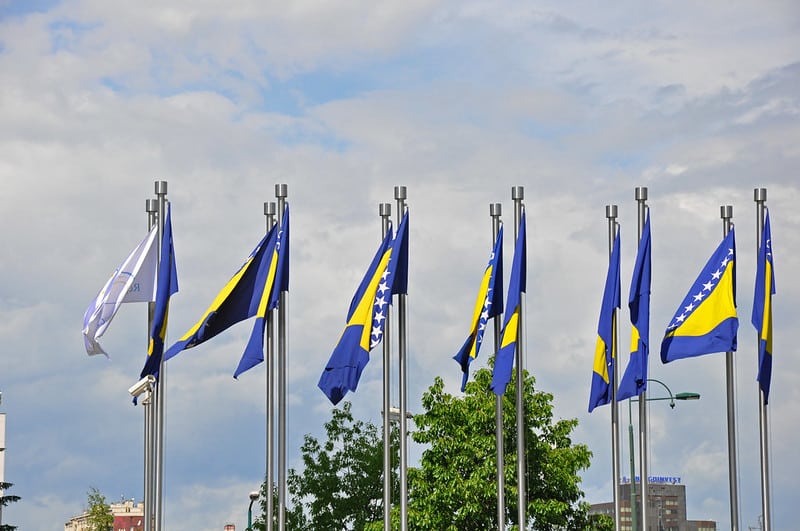Bosnian national flags outside the parliament (Flickr, 2011)
The Bosnian elections held in early October were seen in advance as momentum to break with the trends of voting along ethnic lines. It ended up being a saga full of controversy, (symbolic) changes, and, as a climax, a recount. But what exactly changed in Bosnia and Herzegovina now that this saga is concluded?
Competition with ethnonationalism largely successful
Breaking with ethnonationalism has not succeeded everywhere in Bosnia and Herzegovina. But after years in which nationalist presidents have been appointed from the Federation of Bosnia and Herzegovina (FBIH) and Republika Srpska (RS), Denis Bećirović’s (SDP) landslide victory over Bakir Izbetgovic (SDA) is a welcome symbolic change. In a response to the election results, the Forum of Left Initiative (FLI) expressed its satisfaction with Bećirović’s victory:
“General election results have shown that at the moment there are 2 changes. One is a big symbolic change in presidency where a social democrat [Bećirović] will be member of presidency as a Bosniak for the first time in history and hinders the influence of the biggest ethno-nationalist party [SDA].”
Although the presidency in Bosnia has mainly symbolic value, Bećirović’s election seems to be a step towards progressiveness and togetherness and a step away from ethnicity-based and divisive voting. Together with Željka Cvijanović (Serb, SNSD) and Željko Komšić (Croat, DF), he is part of the triplet that shares the presidency in Bosnia and Herzegovina.
Progressive coalition as the biggest political actor
The second positive change according to FLI is the success of the progressive coalition in this election. The coalition between the social-democratic SDP, the centre-right People and Justice Party, and the liberal Our Party (NS) has done well and became the biggest political actor at the state level and within FBIH.
In principle, the progressive bloc has the most capacity to lead and form a government, but within Bosnia and Herzegovina’s complex electoral and state system, it depends on the number of deputies elected at the cantonal level, as deputies for the Upper House in the Entity of FBIH will be delegated to different ethnic houses from cantons by parliamentary majorities. The party or coalition with the most deputies in the Upper House of the Federal Parliament decides on the formation of a government.
Dodik’s re-election hints that Republika Srpska is lagging behind
Unfortunately, the changes in the FBIH do not seem to be replicated in RS. Even after a recount, Milorad Dodik won the presidency in RS over his main competitor Jelena Trivić. The recount of votes took place after the opposition accused Dodik of electoral fraud. After the first count, both Dodik and Trivić declared themselves winners. With Dodik also declared the winner by election officials after the recount, he can now start preparing for his third term as RS president.
For those seeking EU affiliation and solidarity in Bosnia and Herzegovina, Dodik’s re-election and the stabilisation of the SNSD as the largest party in the RS is a bad development. Dodik and his SNSD party live mainly on populist and ethno-nationalist sentiments, manifested in policies aimed at seceding RS from the rest of Bosnia and Herzegovina, severing ties with Europe and strengthening ties with the Kremlin.
What’s next?
Now that the results have been officially confirmed, the next step is to form governments in Bosnia-Herzegovina. A difficult process, given that the emerging opposition and the established ethnonationalist parties seem to be dead-set against each other. The FBIH was led by a caretaker government between 2018 and 2022 after the main parties could not agree on forming a governing coalition. With the progressive bloc, there seem to be opportunities to avoid a similar problem.
In the RS, the main question is how far the SNSD will go to fulfil its electoral promises and goals. In the previous reign, it has already been observed that the constitution is regularly flouted by the RS government, which is increasingly usurping state competences (taxation, judiciary, defense and security) and dismantling state institutions. This already resulted in several judicial steps against Dodik and RS in the past.
Tensions in Bosnia remain unabated. The recent recommendation of Bosnian EU candidate status with an additional roadmap provides a handle on the country’s European perspective. But internal polarisation and the secessionist politics of the SNSD keep creating new obstacles. Bosnia and Herzegovina remains a country where challenges keep piling up as long as ethnonationalism can manifest itself as a divisive factor in politics.
Author: Mathieu Neelen
Sources: AlJazeera1, AlJazeera2, BalkanInsight, EuropeanCommission, France24, RadioFreeEurope, Reuters
Photo: Flickr



